| Srl | Item |
| 1 |
ID:
131049
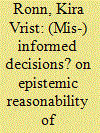

|
|
|
|
|
| Publication |
2014.
|
| Summary/Abstract |
Given the contemporary political situation and the interlocking concerns with effecting control over crime and terrorism, and the way in which intelligence-oriented logics are being proposed as a key component of the toolkit for such tasks [u]nderstanding the epistemological and ontological basis of intelligence work is an important undertaking. 1
Intelligence inquiry has previously been conducted mainly in the domain of national security, clandestine operations, and military activities. In the last two decades, intelligence has branched out in domains other than those traditionally and strictly related to national security, such as criminal intelligence within policing. The increased emphasis on intelligence and intelligence-led investigations is evident in existing policing strategies, especially when policing organized and serious crime. 2 An underlying assumption in this tendency is that intelligence contributes to the rationalization of crime control, and will enable informed decisions, ensure police efficiency, and meet the "need for an objective, decision-making framework.
|
|
|
|
|
|
|
|
|
|
|
|
|
|
|
|
| 2 |
ID:
131043
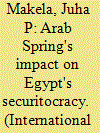

|
|
|
|
|
| Publication |
2014.
|
| Summary/Abstract |
In a 7 March 2012 article in the Washington Post, prominent journalist and Middle East expert David Ignatius wrote that Egypt was sliding toward ruin. 1 His pessimistic assessment was based on the developing security situation, or lack of it. Security was lacking at the street level and beyond. Once the Arab world's most powerful country, Egypt's economy has since been shattered, and its security situation badly deteriorated. Political power struggles continue to rage and the compass of the nation's foreign policy has been lost. Security experts well recognize multiple simultaneous spirals of violence and believe that Egypt is on its way to becoming a failed state.
|
|
|
|
|
|
|
|
|
|
|
|
|
|
|
|
| 3 |
ID:
131052
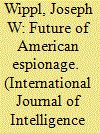

|
|
|
|
|
| Publication |
2014.
|
| Summary/Abstract |
Espionage has been around a long time, to be sure, back to biblical and ancient times. But when specifically, was American espionage last discussed? The intent of the National Security Act of 1947 was to establish an agency for espionage and analysis. From 1947 to 1989, while United States espionage was global in scope, in the sense that it reported on a multitude of topics, the majority mostly forgotten or ignored in subsequent discussions, espionage heavily reflected the Cold War emphasis on the Soviet Union. The Cold War gave American intelligence cover to engage in espionage. American espionage has a future but it will have to fit into the future of the United States. The time has arrived to think about that future and how espionage must fit into it.
|
|
|
|
|
|
|
|
|
|
|
|
|
|
|
|
| 4 |
ID:
131044
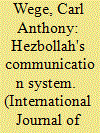

|
|
|
|
|
| Publication |
2014.
|
| Summary/Abstract |
During the two generations of Hezbollah's existence the organization has grown from a clan-based network of terrorist cells to the most important stakeholder in the Lebanese polity. Its communication architecture evolved concurrently with the larger Hezbollah organization. The trajectory of Hezbollah's communications architecture has been in the direction of increasingly sophisticated communications and the need to transmit greater volumes of information securely across a growing organization.
|
|
|
|
|
|
|
|
|
|
|
|
|
|
|
|
| 5 |
ID:
131045
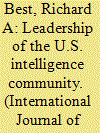

|
|
|
|
|
| Publication |
2014.
|
| Summary/Abstract |
Intelligence agencies exist to support government officials with information and analysis; unlike some academic institutions, they do not exist simply to promote the greater diffusion of knowledge. Intelligence officials serve a wide array of masters-Presidents, diplomats, policy planners, military commanders, and other government officials. In the United States, the need to support these diverse masters has brought into existence a complicated and cumbrous community of some seventeen organizations. 1 These agencies have been created over many years to describe and analyze the international environment and, ideally, give advance warning of imminent developments.
|
|
|
|
|
|
|
|
|
|
|
|
|
|
|
|
| 6 |
ID:
131051
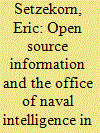

|
|
|
|
|
| Publication |
2014.
|
| Summary/Abstract |
The role of open source intelligence (OSINT) has expanded greatly since 11 September 2001 (9/11) and the 2010-2011 Arab Spring as analysts and policymakers have struggled to understand the challenges and opportunities of globalized information. The contemporary trend toward open source collection and analysis is not fundamentally new in its methods, but rather marks a return to traditional methods of intelligence gathering that have been overlooked in favor of spy satellites, drones, and signal intercepts. Beginning in the early 1900s, the United States Office of Naval Intelligence (ONI) developed an extensive system of open source intelligence collection and analysis. The primary target of the ONI's efforts was the naval development of the Empire of Japan. An exploration of the connections between open source intelligence and the behavior of American negotiators at the Washington Naval Conference of 1921-1922 presents a historical setting for later developments.
|
|
|
|
|
|
|
|
|
|
|
|
|
|
|
|
| 7 |
ID:
131047
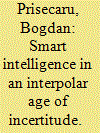

|
|
|
|
|
| Publication |
2014.
|
| Summary/Abstract |
Concepts are the filters usually used when trying to add labels to various aspects of reality and explain what is occurring. Thus, most of the time the concepts evolve behind the events and represent the result of a series of interactions within a certain period of time.
Contemporary perceptions of world events were highly influenced by the Cold War period when the threat of mutually assured destruction was synonymous with the end of the world as known until that time, but it also meant forty-five years of relative equilibrium.
|
|
|
|
|
|
|
|
|
|
|
|
|
|
|
|